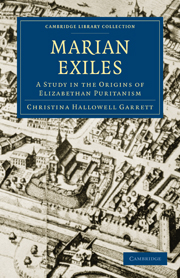Book contents
- Frontmatter
- Contents
- Author's Preface
- INTRODUCTION: a revaluation of the Marian Exile of 1553–8 in the light of newly discovered documents
- I ‘Migration’ or ‘Flight’?
- II The exodus to France
- III The migration to Germany
- CENSUS OF EXILES
- APPENDIX OF DOCUMENTS
- Abbreviations used for books referred to in the Census
- Index to the Introduction
II - The exodus to France
Published online by Cambridge University Press: 07 September 2010
- Frontmatter
- Contents
- Author's Preface
- INTRODUCTION: a revaluation of the Marian Exile of 1553–8 in the light of newly discovered documents
- I ‘Migration’ or ‘Flight’?
- II The exodus to France
- III The migration to Germany
- CENSUS OF EXILES
- APPENDIX OF DOCUMENTS
- Abbreviations used for books referred to in the Census
- Index to the Introduction
Summary
Since lists are in themselves dull things, the Census may need a persuasive word of justification. Yet it is obvious that without knowing, more accurately than we have done, what percentage of the population of Tudor England was represented in the exodus, what proportion of the Edwardian reformation was represented, or what sections of English society shared in the experience, its influence cannot well be traced, nor its importance gauged in relation to the future. Theories may not safely rest upon ambiguities. Zeal and imagination have both played too large a part in earlier computations.
Of course it is upon the word of John Foxe, himself an exile, that all later estimates of numbers have been based, and Foxe says that ‘many Englishmen fled… well near to the number of 800 persons, students and others together’. Perhaps the vagueness of this statement will not be immediately apparent, but—who were these ‘others’? Men or women? Does Foxe intend his ‘800’ to be a comprehensive figure, including all those who fled throughout the five years, or does it cover the number of men only? He leaves us to guess. Fuller evades the question altogether. Heylyn makes two statements which, though they appear to be contradictory, may have been intended to remove one of Foxe's ambiguities. Three hundred ‘or thereabouts’, he says, fled under cover of the foreigners (that is on 17 February 1554) and 800 ‘had forsook the kingdom’, which we take to mean ‘in all’.
- Type
- Chapter
- Information
- The Marian ExilesA Study in the Origins of Elizabethan Puritanism, pp. 30 - 37Publisher: Cambridge University PressPrint publication year: 2010First published in: 1938



